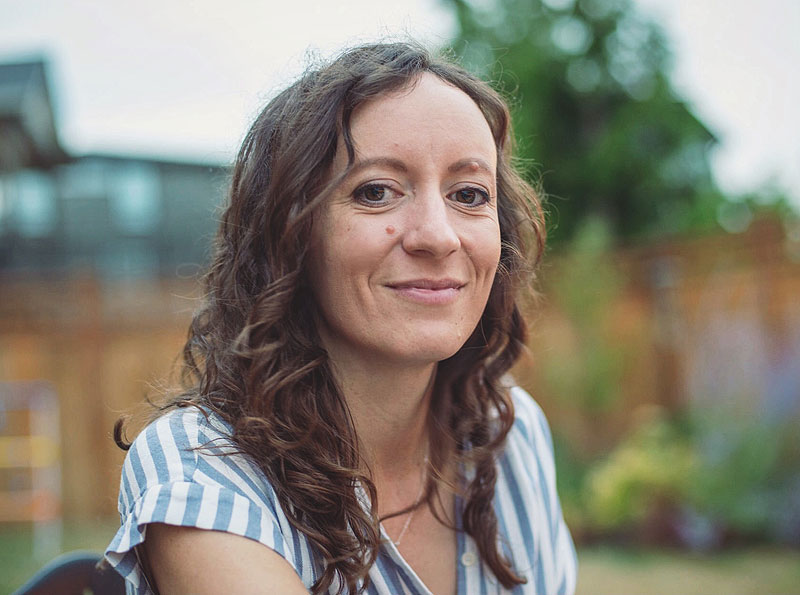
How LGBTQ+ Writers Helped Expand Transgender Health Benefits for Guild Members
In their own words, hear from two members who advocated for, and helped to secure, inclusion of gender-affirming care in the PWGA Health Plan.
Written by Eleanor Jean and Katrina Mathewson
(8/9/2022)
I’m Eleanor Jean and I’m a queer, trans female television writer. I began my transition six years ago, before I was a Writers Guild member, when I was on the “assistant track” and not making rent. I couldn’t imagine what my transition would look like, but I did know that, if I could somehow get staffed as a writer, I could join the WGA, and I would suddenly have “the best healthcare plan in town.”
That’s how the Guild’s health plan had always been described to me.
So, when I was staffed and became a member in 2018, I assumed that my Cadillac health plan—the one that covers unique care related to piloting one’s own airplane and deep-sea diving—would cover the basics for its trans members…but I was shocked by how incorrect my assumption was.
After days of digging through vague descriptors and calling every phone number in the benefits handbook, I discovered that, when it came to gender-affirming care, the WGA only covered some hormonal care, and genital surgery. Not only was it significantly less coverage than that offered at places like Starbucks and Amazon, but also significantly less than public insurance options such as Medi-Cal and L.A. Care offered.
In short, it would’ve made more financial sense for me to quit writing television in order to transition…but at least I could go deep-sea diving.
The discrepancy was massive; it was inequitable and vastly behind current science and medical care guidelines. But while this gulf was huge, it was clear the discrepancy wasn’t intentional. (Hell, I’m trans, and I had just found out. Surely it was an oversight on everyone’s part.) So, I hoped there was a way to change the big machine if only more people knew about the oversight. That’s when I met Katie.
 Katrina Mathewson
Katrina MathewsonKatrina Mathewson:
When I stepped into my term as co-chair of the LGBTQ+ Writers Committee in May of 2020, I thought I had a strong handle on All Things Queer™️. I felt well educated on diversity and equity issues, I had friends who represented every letter of the LGBTQIA+ acronym, and I was gay, for crying out loud. I lived it!
But by the end of my second week, the gaps in my knowledge had already begun to appear. I regularly found myself repeating a phrase I first heard from my friend Paula Stone Williams: “You don’t know what you don’t know.”
This became immensely clear when my co-chair Spiro Skentzos and I met with Eleanor Jean. Up until then, I had been a big proponent of the WGA’s health plan. Why wouldn’t I be? As a relatively healthy adult, I felt as though my needs were met, and I assumed the same was true for all members. In fact, if asked what I thought the plan covered when it came to transgender-specific care, I would’ve confidently guessed, “Everything!”
And I would’ve been very wrong.
The truth was, the plan excluded over 90% of WPATH’s recommended coverage. (WPATH is the World Professional Association for Transgender Health, the standard for trans healthcare.) Jaclyn Moore, showrunner of Queer as Folk (created by Stephen Dunn, based on the series by Russell T. Davies) and Dear White People (created by Justin Simien), painted perhaps the clearest picture when she tweeted that Starbucks baristas received better and more inclusive trans coverage.
Jaclyn had achieved the height of television success as a member of the WGA, yet still couldn’t afford gender-affirming care—so imagine the barriers all the other trans writers might face.
After my initial shock subsided, shame replaced it. How could I be unaware of such a problem within my own community? The answer was simple: As a cisgender person, I didn’t know what I didn’t know. But one thing I was confident about? Shame wouldn’t solve anything; what we needed was action.
For Eleanor Jean and me, two writers who didn’t belong to the PWGA Pension & Health Plans Board of Directors/Trustees and had only recently learned of the group’s existence, action meant a few things. It meant seeking out support, which we found via my committee co-chair Spiro, vice chair Rob Forman, and fellow members of the WGA’s Inclusion and Equity Group. “Action” meant sitting down with over 50 trans and gender non-conforming (TGNC) Guild members. And we quickly learned it meant a long, bureaucratic process of lobbying said Health Board. Thankfully, we found invaluable allies and excellent listeners in PWGA Board members Stan Chervin, Lise Anderson, and CEO Jim Hedges.
 Eleanor Jean
Eleanor JeanEleanor Jean:
Changing the WGA health plan would be complicated and would take a while, but Katie and I learned that the strongest and most persuasive argument would be a financial one. As our allies on the board worked to prepare a proposal for policy change, we sent emails, made calls, gathered vital information, and looked for ways to bolster our argument.
We believed the plan should be amended to explicitly cover all WPATH standards (aka everything it explicitly excluded at the time), following in the footsteps of Google, Facebook, Amazon, and a growing number of corporations. We had to think in terms of dollars and cents, not in terms of the real people—our friends and colleagues—who needed this life-affirming care for themselves and their dependents. This proved difficult because that was the only thing we cared about…especially at a time when attacks against the trans community were, and still are, rampant.
Ironically, during one fact-finding mission, a well-meaning ally mistakenly used the term “gender dystopia” instead of “gender dysphoria,” and in some ways, it didn’t feel far off. In 2022, 35 states have already proposed anti-trans bills. In the time we spent lobbying, we watched trans rights take hit after hit, particularly when it came to restricting, rolling back, and taking away trans healthcare.
Change isn’t a moment; it’s a series of moments. And for us, the lobbying and proposal process took nearly two years. At times, it felt hopeless and like we were running in circles. At other times, there were moments of inspiration and encouragement. We found workplace after workplace which either covered trans healthcare, or didn’t at the time and wanted our input on how to best enact change.
We learned, we inadvertently helped others, and we waited. But ultimately, the process of amending the WGA’s health plan required a significant amount of blind faith, particularly when Katie and I learned we weren’t able to attend the Health Board meeting when the proposal would actually take place. We did everything we could to have a voice in the room, but at some point, we had to put our trust in our allies to make a compelling enough argument. We had to hope that a room full of cisgender people would make the right choices when it came to transgender bodies and lives.
And they did.
Katrina Mathewson:
On December 10, 2021, the Health Board of Trustees heard a proposal which aimed to align the PWGA’s trans care with the impressive standards set by the World Professional Association for Transgender Health.
Meanwhile, I was in the writers’ room, anxiously awaiting the results of the vote. My phone rang just before lunch. It was Stan Chervin, our confidant on the board. Stan told me that, after hearing the proposal, the board voted yes, expanding coverage for TGNC members and their dependents ten-fold.
I felt tears on my cheeks before I had even fully wrapped my head around Stan’s words, but nothing compared to the feeling of sharing the good news. First, with Eleanor Jean, who brought me into the fight almost two years ago, and then with our entire LGBTQ+ Committee membership.
As of June 1, 2022 (Pride month, notably), the Writers Guild of America fully covers many trans healthcare services (and is prepared to adjust with WPATH, as standards continue to evolve)—the first Guild in the industry to do so.
There’s no doubt that this momentous shift was unfelt by most. To be ignorant is a privilege, after all. You don’t know what you don’t know. And there are probably thousands of writers who received the PWGA’s “Summary of Material Modifications” in the mail at the beginning of April and tossed it, because they saw the words “transgender services” and figured it wouldn’t affect them.
But as Eleanor Jean and I see it, that’s okay. We’re thinking about the writers and dependents, both current and future, whose lives will be changed for the better. We’re also thinking about the members of other unions who will be able to ask for the same standard of care, now set by the WGA.
If there’s one thing we hope this can illustrate, it’s the power of individuals to “change the big machine.” We’re sure there are plenty more discrepancies in our health coverage, and we hope to listen and help other Guild members and groups who bring these to light. As queer writers, we feel grateful to have found allies willing to learn about their blind spots, then use their positions to affect change for others. As James Baldwin said, “Not everything that is faced can be changed, but nothing can be changed until it is faced.”
Gender-affirming care is life-saving.
As of June 1, 2022, the Writers’ Guild-Industry Health Fund Plan benefits now include coverage of such medically necessary services as gender-confirmation surgeries; continuous hormone replacement therapy and lab testing; diagnosis of, and treatment for, gender identity disorders/dysphoria and associated diagnoses; and puberty-suppression hormone therapy for transgender adolescents.
Plan participants should call the Health Plan at (818) 846-1015 or toll-free (800) 277-7863 or email questions to Pmailbox@wgaplans.org for specific and detailed guidelines regarding coverage of gender-affirming care.
Eleanor Jean and Katrina Mathewson are members of the WGAW LGBTQ+ Writers Committee.
